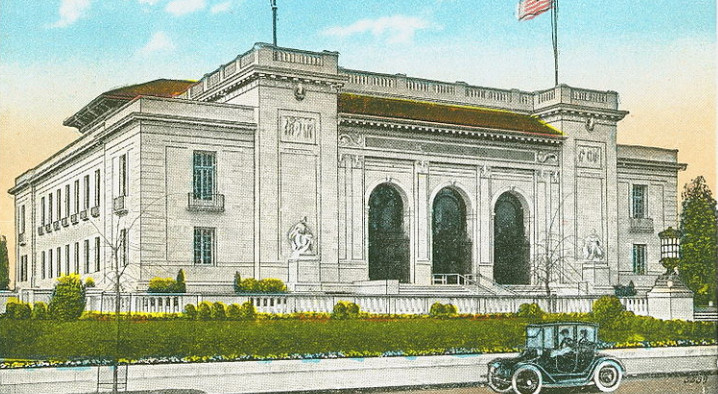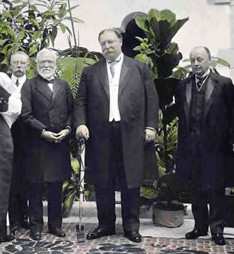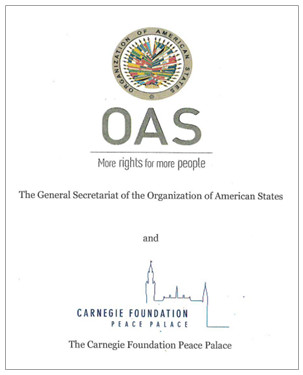Today, the OAS brings together all 35 independent states of the Americas and constitutes the main political, juridical, and social governmental forum in the Hemisphere.
The Organization uses a four-pronged approach to effectively implement its essential purposes, based on its main pillars: democracy, human rights, security, and development. OAS
On September 11, 2001, Secretary of State Colin Powell was in Lima Peru at a summit meeting of the Organization of American States to sign the Inter-American Democratic Charter.
In a paper written by FOCAL – a Canadian non-governmental organization established by the Canadian government, was the following;
A Magna Carta for the Americas
The Inter-American Democractic Charter:
Genesis, Challenges and Canadian Connections
The terrorist catastrophes in New York and Washington swept away media comment on other global events taking place on September 11, 2001. Virtually obscured was the historic agreement reached that day in Lima by the foreign ministers of the Organization of American States (OAS) on the Inter-American Democratic Charter.
The OAS foreign ministers met scarcely an hour after the terrorist attacks. As they gathered in Lima the previous evening, there was apprehension that one or more of them might introduce wording that would blunt some of the Charter’s teeth. By the time the meeting was underway, it was clear that the terrorist attacks had removed that concern. Instead of departing immediately for the airport, Secretary of State Colin Powell delayed his return flight to Washington for several hours in the hope that he could leave with a strong and unanimously approved Charter. In a dramatic but subdued intervention, he invited his colleagues to accept the fairly robust draft that had been referred to this Special Assembly of the Organization by the OAS Permanent Council.
While giant TV screens outside the hotel replayed the tumbling towers, the Charter was adopted by acclamation and Powell left for the airport. He had rightly judged the impact that his decision to remain even briefly at the meeting would have on the other foreign ministers. On the first day of the terrorist crisis, Powell had given priority to multilateralism.
Pan-American Union
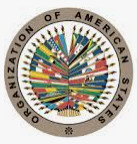 The Organization of American States is the successor name of the Pan-American Union but the mission is the same as the original organization.
The Organization of American States is the successor name of the Pan-American Union but the mission is the same as the original organization.
The First International Conference of American States was held in Washington, D.C., October 1889 to April 1890 “ for the purpose of discussing and recommending for adoption to their respective Governments some plan of arbitration for the settlement of disagreements and disputes that may hereafter arise between them, and for considering questions relating to the improvement of business intercourse and means of direct communication between said countries, and to encourage such reciprocal commercial relations as will be beneficial to all and secure more extensive markets for the products of each of said countries.”
Eighteen American States took part in that Conference, in which it was agreed to constitute the “International Union of American Republics for the prompt collection and distribution of commercial information,” with its headquarters in Washington. Later it was to become the “Pan American Union” and, eventually, as its functions expanded, today’s General Secretariat of the OAS.
Continue Reading the History of the OAS. (highlighted copy).
Regional Community to Community
In the OAS history, they documented the problem of what to call this regional superstructure sitting on our faces. One of the suggestions was “regional community”. That was cut down to simply Community.
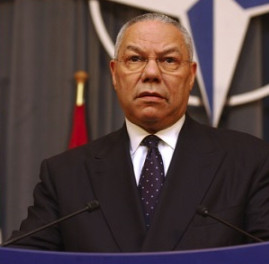
Colin Powell, Secretary of State (2001-2005)
BASIC DOCUMENTS PERTAINING TO HUMAN RIGHTS
IN THE INTER-AMERICAN SYSTEM
The Inter-American Democratic Charter
Adoption: September 11, 2001
This Charter, approved by a special session of the OAS General Assembly, reaffirms that the promotion and protection of human rights is a basic prerequisite for the existence of a democratic society, and that democracy is indispensable for the effective exercise of fundamental freedoms and human rights, which are universal, indivisible and interdependent. The Inter-American Democratic Charter establishes in its Article 8 that any person who considers that his or her human rights have been violated may lodge a complaint or petition before the inter-American system for the protection and promotion of human rights.
I. THE OAS AND THE EVOLUTION OF THE INTER-AMERICAN HUMAN RIGHTS SYSTEM
Full respect for human rights is enshrined in various sections of the Charter, reaffirming the importance that the Member States attribute to it. Accordingly, the Charter emphasizes that “the true significance of American solidarity and good neighborliness can only mean the consolidation on this continent, within the framework of democratic institutions, of a system of individual liberty and social justice based on respect for the essential rights of man.”
2010: House of the Americas turns 100.
One hundred years ago, on April 26, 1910, President William H. Taft, along with hemispheric leaders, dedicated the House of the Americas, a building which represents the regional cooperative work improving the lives of the peoples in the Americas. This magnificent building, which houses the headquarters of the Organization of American States (OAS), was built with generous funding from Andrew Carnegie and has become one of his most notable public gifts. The building’s architecture represents the Organization’s objective of promoting peace, democracy, human rights, security, and development.
1911
SPECIAL SESSION OF THE GOVERNING BOARD OF THE PAN AMERICAN UNION TO HONOR ANDREW CARNEGIE
On May 5th 1911, in accordance with a resolution adopted at the Fourth International Conference of American States, a Special Session of the Governing Board of the Union was held to honor Andrew Carnegie and express the American Republics’ gratitude for his vast contributions to the Pan American cause and for his generous gift towards the cost of the new Pan American Union building, House of the Americas. A large audience of distinguished guests, numbering over 1000, gathered in the Hall of the Americas. The Ambassador of Mexico, Senor Don Manuel de Zamacano e’ Inclan, in the presence of the US President and Secretary of States, members of the diplomatic corps, senators, congressmen and Supreme Court judges, presented Andrew Carnegie with a gold medal, engraved with Benefactor of Humanity.
The Hague and the Pan American Building
Harry Truman proclaimed April 14th as Pan-America Day.
Act of Bogata, , September 13, 1960
The Charter of Punta del Este, Establishing an Alliance for Progress Within the Framework of Operation Pan America; August 17, 1961
Declaration of the Presidents of the Americas, April 14, 1967
Proclamation on Pan America
On April 13, 2021, Joe Biden signed a Proclamation on Pan America Day and Pan American Week.
One hundred and thirty-one years ago, our hemisphere formed the International Union of American Republics — the oldest regional international organization in the world, and the precursor to the modern-day Organization of American States. On this Pan American Day and Pan American Week, we reaffirm the strength of our regional community, celebrate the democratic principles that unite us, and resolve to work together to overcome the common challenges before us.
So many of the greatest challenges facing us today are not confined to our respective national boundaries. The global COVID-19 crisis has laid bare persistent inequalities in our societies and structural weaknesses in our economies. Climate change poses an urgent national security threat that is hurting communities throughout the region today and jeopardizing future generations. We are witnessing a humanitarian crisis . . .
This year, as we mark the 20th anniversary of the Inter-American Democratic Charter, each of our governments has an obligation to renew, promote, and defend that groundbreaking commitment we made — that all people who call the Americas home have a right to democracy. The Democratic Charter remains at the core of our hemispheric union, working through the Organization of American States, to advance a bold and determined vision of a region whose governments honor and respect democratic values, human rights, fundamental freedoms, and the inherent dignity of each individual.
What becomes crystal clear when looking at the organizational structure that has been built for Global Health is that American political leaders are liars, cowards and thieves. If there is a God, they will all rot in hell for eternity.
George W. Bush – remarks to the OAS, April 17, 2001.
The series of Summits that were held between

